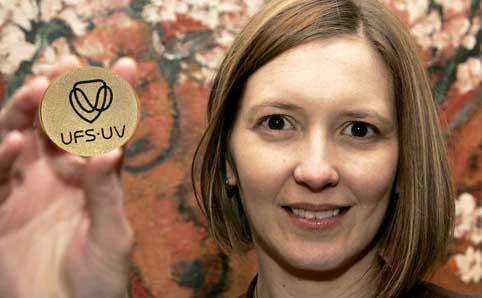Latest News Archive
Please select Category, Year, and then Month to display items
02 January 2025
|
Story Gerda-Marie van Rooyen
|
Photo Supplied
 Leading the research in South Africa is Prof Linus Franke from the Department of Soil, Crop and Climate Sciences.
Leading the research in South Africa is Prof Linus Franke from the Department of Soil, Crop and Climate Sciences.
Scientists are actively pursuing the successful breeding of diploid hybrid potatoes from inbred lines. This is expected to revolutionise potato breeding as it holds the key to rapid genetic progress. It will introduce new varieties for commercialisation through seed. Currently, existing potato variants have a gene that renders self-pollinated seeds infertile.
Prof Linus Franke, an academic in the Department of Soil, Crop and Climate Sciences at the UFS, is leading the research in South Africa. “This technology allows the production of genetically uniform potato seed that is easy to transport and largely disease-free.” He says this differs from conventional breeding whereby only vegetative propagation is possible due to tetraploid varieties in potatoes. It also risks carrying pests and diseases from one generation to the next – leading to the accumulation of pests and diseases with each round of multiplication.
Seed innovation
Prof Franke explains that Solynta BV, a seed company based in the Netherlands that produces potato varieties that can be grown from seed, has included South Africa in their research efforts because it is one of Africa’s largest producers and exporters. Through his academic relationship with Wageningen University and Research, a Dutch institution renowned for its agricultural endeavours and food production, the UFS became involved in researching hybrid potatoes grown from seed.
Diploid seeds containing two sets of chromosomes allow easier gene manipulation to increase predictability and speedier genetic progress. The breeding approach enables the incorporation of tolerance to pests, diseases, abiotic stresses (cold, heat, drought) and other desired genetic traits.
Although Prof Franke is optimistic about this research, he is not blind to disadvantages. “Potato seeds are tiny and have little energy reserves, making it harder to grow potatoes from seed than from tubers.” He says potatoes from seed will take longer to cultivate than tubers, as farmers need to grow plantlets from seeds first, adding six weeks to the growing period. “It is possible that commercial farmers can grow potatoes directly from seed. Alternatively, perhaps more likely, specialised growers will produce tubers of potatoes from seed; these tubers are then sold as seed tubers to other potato farmers, who then continue their normal practices of producing potatoes for the market from tubers.”
Financial benefits
Prof Franke says farmers have reason to get excited. “Seed potatoes will reduce input costs, as varieties with enhanced tolerance to pests and diseases require less pesticides. Planting one hectare of potatoes requires three to four tonnes of potato tubers, but only one 25 g packet of potato seeds.” Since potatoes are a more valuable commodity than maize, this technology might also increase farmers’ income potential.
Computer Science lecturer receives Vice-Chancellor’s Award for teaching excellence
2011-11-11
 |
|
Dr. Liezel Nel from our Department of Computer Science.
Annually, many lecturers receive awards and recognition for their contribution to the UFS’s plans to accomplish outstanding academic performance.
Photo: Johan Roux
|
This year, the UFS presented its fourth awards function for outstanding learning and teaching.
At the awards function this past week, lecturers were rewarded for their outstanding teaching inputs at the UFS.
Dr Liezel Nel from our Department of Computer Science and Informatics was awarded the Vice-Chancellor’s award for her outstanding contribution to teaching and learning at the UFS.
The award, together with other awards presented to lecturers for outstanding teaching and learning, was instituted to encourage innovative teaching methods in departments in order to achieve outstanding academic results.
The Vice-Chancellor’s award is awarded to the lecturer who not only displays good leadership, but has also published research during the preceding year, with excellent knowledge and teaching skills in his/her discipline.
Dr Nel said she had realised over the past years that educators increasingly had more teaching resources at their disposal than before, which could be utilised to improve the teaching and learning experience of students.
“Therefore, I constantly renew my study material and the way in which I present the material. Currently I use a combined method, which includes electronic presentation by means of Blackboard, personal interaction and sessions, which enable the student to take ownership of the module.”